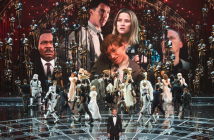
Editor’s Notes: This article was provided by Social Monsters.
The entertainment industry is perhaps the most enthusiastic supporter of VR technology. Across the spectrum of entertainment, virtual reality is the future and the masses are not only embracing it, but are eager to get this technology in their homes. And although the the consumer model isn’t even available yet, by mid-2014, the Oculus Rift development kit prototype had already sold more than 100,000 units, according to Games Industry.
What can we expect moving forward? Here’s a look at the future of entertainment as we enter into this bold new virtual frontier.
Gaming
Perhaps the most obvious use of VR technology is in gaming. High quality VR gaming is already up and running; Road to VR lists nearly 30 fully-developed Oculus Rift-compatible titles and dozens more are patched to run on the Rift. It’s easy to see how some titles lend themselves to virtual reality—flight sims, first person adventure games and shooters already place us in the character’s POV. With so many games patched for Oculus gameplay, expect more VR adaptations of titles like the acclaimed “Batman: Arkam City” and the upcoming “Battlefield Hardline” (which already blurs lines between television and gaming with its cop-drama storyline).
Live Entertainment
Video games aren’t the only way virtual reality will soon show itself. While virtual reality in live entertainment might sound like something out of science fiction, it is already happening—UberGizmo reports that the most recent NBA All-Star game was filmed using a pair of virtual reality cameras specifically for the Samsung Gear VR. Virtual reality technology has the amazing potential to deliver live entertainment experiences directly to consumers in their homes, giving every audience member the best seat in the house while providing a 360 degree view from vantage points previously inaccessible to audiences.
Imagine having a virtual seat on-stage at your favorite band’s concert and you are starting to see the potential that virtual reality technology has for live entertainment. As more and more entertainers realize the potential of VR media, we are bound to see more and more concert films and interactive experiences brought to consumers’ homes in the form of virtual reality.
Film and Video
As streaming video has expanded its role in the entertainment market, television has slumped. Consumers prefer the convenience of digitally streaming media, and virtual reality technology is going to revolutionize this market: the LA Times reported that Oculus is planning to launch its own film label, as announced at the 2015 Sundance Film Festival.
Virtual reality film would allow viewers to consume the same media but have radically different experiences of that media—imagine a drama filmed in virtual reality from multiple points of view: two audience members sitting side-by-side might see the action unfolding from very different perspectives. Furthermore, these shifts in audience perspective will color the narrative for viewers, sparking conversations between audience members about what “really” happened and driving them back to the media for multiple re-views. The very nature of the VR film begs the question as to whether “viewing” is still the right word to use, or whether it should be “experiencing.”
Virtual reality gaming is just months away from its full potential and is already widel y recognized as one of the biggest tech developments the world has ever seen. It’s time to prepare for its infiltration of the entertainment industry.



